
A Legend of Ethshar
With A Single Spell was the second novel in the Ethshar series -- though it's not second in internal chronology. It's the story of an apprentice wizard whose master has died after teaching him only a single simple spell. He sets out to seek his fortune equipped with nothing but the means of magically lighting fires, and stumbles into far more than he ever expected.

| Cover gallery |
|---|
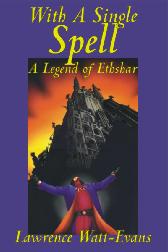
|
| The Wildside edition
|
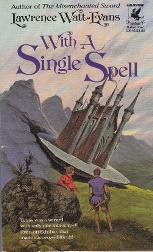
|
| The Del Rey edition Art by Darrell K. Sweet
|
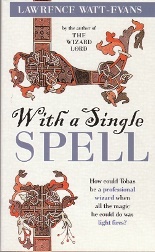
|
| The Cosmos edition Cover design by Stephen H. Segal
|
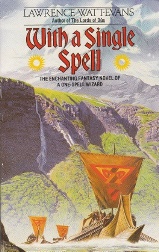
|
| The British edition Art by Geoff Taylor
|
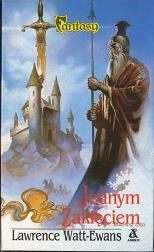
|
| The Polish edition Art by Boris Vallejo
|
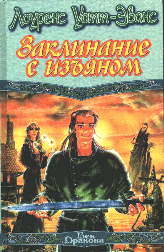
|
| The Russian edition Art by Anatoliy Dubovik (This is an omnibus of With A Single Spell and The Misenchanted Sword, and the cover title is for the latter.)
|
With A Single Spell
A Legend of Ethshar
by Lawrence Watt-Evans
Chapter One
 he little cottage at the edge of the swamp, wherein old Roggit had lived out his life, was not, strictly speaking, a part of the village of Telven. However, located as it was just over a hill from the edge of town, it was near enough that Roggit had been accepted as a Telvener; no one had protested when his apprentice Tobas had called on the villagers to attend his master's funeral.
he little cottage at the edge of the swamp, wherein old Roggit had lived out his life, was not, strictly speaking, a part of the village of Telven. However, located as it was just over a hill from the edge of town, it was near enough that Roggit had been accepted as a Telvener; no one had protested when his apprentice Tobas had called on the villagers to attend his master's funeral.
Of course, quite aside from any fine distinctions about the village boundaries, it was never wise to anger a wizard, or even a wizard's apprentice -- not even one as untrained as Tobas surely was, after merely a year or two of study under a man who had been in his dotage and on the verge of senility for as long as anyone remembered.
As a result of these considerations, in addition to the usual morbid curiosity natural upon the cremation of one of the area's older and more eccentric inhabitants, the ceremonies drew a good crowd, with more than half the townspeople in attendance. As Tobas saw them all silently departing after the fire died, he realized glumly that he could not say a single one, old, young, or in between, had come out of honest friendship or sympathy for either the dead wizard, or for himself, the surviving apprentice.
He had had friends in his younger years, he told himself, but they all seemed to have drifted away when his luck went bad. Since his father's death he had been considered a creature of ill omen, not a fitting friend for anyone.
He watched the villagers wander away in pairs, trios, or family groups, and then set out alone, back over the hill toward the cottage. The sun was still high in the sky. The pyre had burned quickly, as the weather had been dry of late.
As he topped the rise he tried to decide whether he, himself, actually grieved over Roggit's death, and found himself unsure whether his distress was on Roggit's behalf, or simply a reflection of his worries about his own position.
His own position was still, to some extent, in doubt. As Roggit's apprentice at the time of his death, Tobas was heir to everything the old man had owned that had not previously been settled on others, and as far as anyone knew, Roggit had had no children or relatives or even former apprentices to leave anything to. What little there was all went to Tobas.
That, however, was not necessarily a great comfort. Roggit had not been wealthy. He had owned a small piece of land, too swampy to be of much use, and the cottage, together with its contents, and that was all.
At least, Tobas thought, he hadn't been left homeless this time, as he had been when his father died. And the house still held old Roggit's magical supplies and paraphernalia, including, most importantly of all, his Book of Spells.
Tobas would need that. It was all he had left to depend on.
When he had first convinced the old wizard to take him on as an apprentice, despite the fact that anyone not half-blind and half-senile could have seen he was at least fifteen rather than the maximum apprenticeable age of thirteen, Tobas had thought his place was secure. He had expected to live out his life quietly, earning his bread as a small-town wizard, selling love potions and removing curses, as Roggit had done. It had seemed easy enough. He had been initiated into the primary mystery of the Wizards' Guild -- he unconsciously touched the hilt of the dagger on his belt as he thought of it -- and had learned his first spell without difficulty when, after months of delay and apparently unnecessary "preparation", Roggit had finally seen fit to teach him one.
Tobas had thoroughly and beyond all question mastered his first spell, practiced it until he could do it perfectly with no thought at all; when Roggit had at last admitted that the lad had mastered it, he had promised to teach Tobas a second within the month. The apprentice had been looking forward eagerly to this next step in his education when, just two nights ago, the old man had died quietly in his sleep, leaving Tobas with his house and his Book of Spells and his jars and his boxes and his mysterious objects of every description -- but with only a single spell learned, and that nothing but the knack of lighting fires.
The old man had called it Thrindle's Combustion, and Tobas had to admit that it was very useful to be able to light a fire anywhere, at any time, under any conditions, regardless of how wet the fuel was or how fiercely the wind blew, so long as he had his athame -- as Roggit had called the enchanted dagger that was the key to a wizard's power -- and a few grains of brimstone and something that it was theoretically possible to burn. Since learning it Tobas had made it a point never to be without the knife and a supply of brimstone, and had impressed people occasionally by setting fire to this or that. He had used the spell to light Roggit's pyre, and that had added a nice touch to the cremation ceremonies, an appropriate farewell; the villagers had murmured approvingly.
Of course, not every use of the spell had gone so well, he remembered wryly; he had once embarrassed himself by trying to ignite a black rock he had mistaken for coal. The only result had been a shower of ineffectual sparks. Fortunately, the girl he had been showing off for had not realized any more was intended, and had been appropriately amazed.
Useful as it might be, Thrindle's Combustion was not the sort of spell a lad could build an entire career on. It would not earn his bread, nor convince anyone to marry him -- most of the village girls had been noticeably cool of late, though he was not sure why. He had never expected to wed for love, of course -- hardly anyone did -- but he doubted, under the circumstances, whether any of the available females would even consider a marriage of convenience.
He needed to learn more spells, quickly, and establish himself as the town's new wizard. If he failed to secure his position as soon as possible someone might well invite in a foreign magician of some sort, leaving him out of work. The cottage garden, with its handful of herbs, would not be enough to keep him alive if that happened.
Fortunately, he did have Roggit's Book of Spells, but as he picked up his pace, hurrying down the slope to the cottage, he found himself unwillingly imagining reasons he might not be able to use it. Had Roggit written it in some esoteric wizardly tongue? Would the spells he needed call for ingredients he could not obtain? The book was old; might the pages have faded to illegibility, leaving just enough to remind Roggit of what he already knew? Was there some important secret he did not know?
He intended to waste no time. If he lost even a single day in mourning poor old Roggit, something might go wrong. He would open the Book of Spells as soon as he got home.
He crossed the dooryard impatiently, lifted the latch, and stepped into the cottage that was no longer Roggit's. This was his, now.
He looked around, reacquainting himself with the place. His own little bed, a pallet, really, which he would no longer be using, lay in one corner; Roggit's narrow bed, where he intended to sleep henceforth, stood in another. A fireplace yawned at each end, both empty and cold; the weather had been mild, and he had not bothered to do any cooking since Roggit's death. The lone table, used for cooking, dining, and as the wizard's worktable, stood in the center. The long walls, on both sides, were jammed with shelves, cabinets, and cupboards, all packed with the necessities of the wizard's simple life and arcane trade. The ceiling overhead was the underside of the thatched roof, and the floor beneath his feet was packed dirt. The Book of Spells lay in solitary splendor atop its reading stand.
The cottage wasn't much, he thought critically, but it was dry and, when the fires were lit, warm. It was not at its best at present -- the mattress on the bed was bare, as the only blankets had been wrapped around Roggit's remains atop the pyre, and the woodbin and water bucket were empty as Tobas had not paid much attention to the details of everyday life since the catastrophe of Roggit's demise. A few spells that Roggit had cast might still be going here and there, and a few potions or philtres might be tucked away somewhere in the clutter, but no sign of anything magical showed. It looked much like any drab, ordinary cottage.
Still, it was his.
His gaze fell on the Book of Spells and fixed there. That, too, was his. Alone of all Roggit's possessions, that was the one he had never been allowed to touch. The old wizard's sorry handful of semi-precious stones was hidden somewhere in the cottage, hidden even from his own apprentice, but Tobas had been permitted to handle them freely on the occasions when, for one reason or another, they had been brought out. Only the book had been forbidden.
He stepped over to the reading stand and studied it.
It was a large volume, and thick, bound in hinged tin plates of a dull, dark blue-gray; a single large black rune that Tobas could not identify decorated the front. He knew most of the pages were blank, but Roggit had boasted that it held more than thirty different spells, and Tobas had glimpsed several. This book, he was sure, would be the key to his future.
He hesitated, the force of the old man's prohibition still lingering, but then reached out for the dented metal cover. He was well within his rights, he assured himself, and acting in a perfectly reasonable manner, in reading the Book of Spells he had inherited, so that he might teach himself more magic and make a living. It was his now.
He stroked the book gently, as if expecting to feel its magic, but it felt no different from the side of the water bucket. He smiled at his own folly in thinking he might be able to feel the book's magic -- if it even had any of its own. At last, more excited than he cared to admit even to himself, he grasped the worn edge and pried at the heavy tin-coated cover.
Without warning, the black rune on the front exploded loudly and violently in his face, throwing hissing gobbets of orange flame in all directions; none struck him, though one seared away a stray hair as it passed.
Astonished, Tobas simply stepped back at first, staring at the smoldering, blackened face of the Book of Spells. Roggit had, it seemed, put a protective spell of some sort on it, to frighten away thieves. Then the scent of smoke reached him, and he realized that the fireballs had not been pure illusion.
Puzzled and dismayed, he looked about; scattered sparks were dying on the hard-packed floor, and one had singed the table-top but seemed to be expiring without doing much damage.
Where, then, was the smell of smoke coming from?
He sniffed again, then looked up at a faint crackling sound, and saw that one of the fiery projectiles had set the roof afire, right up near the ridgepole. The dry thatch was already burning vigorously.
On the verge of panic, he spun his head about, looking for some way of extinguishing the blaze before it spread. He had not bothered to fetch water; that meant that he had none on hand to douse the fire, and by the time he could make a trip to the well, or even the swamp, half the roof might be gone. He snatched up Roggit's old spare tunic from a nearby shelf, but could not reach high enough to beat at the fire with it. The large blanket, which might have reached, had been on the old man's pyre.
He clambered atop the table, the tunic wrapped about his forearm; as he reached upward one of the legs snapped beneath his weight, dumping him roughly back to the floor. He rolled aside, unhurt, then got to his knees, looking for something else he could stand on.
There was nothing. The chairs, he saw instantly, would not be tall enough to help.
He had to do something; the cottage was almost all he had. He was a wizard, more or less, yet he felt utterly helpless as he watched the flames, a few feet out of reach, licking at the age-blackened ridgepole.
The sight of the spreading fire spurred him to frantic desperation, and a thought occurred to him. He was a wizard; he knew a spell, just a single spell, and it was a fire spell. Didn't the proverbs say to fight fire with fire?
Quickly, he snatched the dagger from his belt, fumbled in his pouch for brimstone, and flung his spell at the burning thatch.
The resulting explosion dwarfed the first; half the roof vanished in flaming shreds, and the force of the blast knocked Tobas to the floor hard enough to daze him.
When he recovered his wits the whole cottage was ablaze, dripping bits of burning debris on all sides. Panicking, he forgot all concern for his inheritance and for anything except saving his skin; he ran out the door, calling wildly for help.
Click here to return to the top of the page 

Origins
The Misenchanted Sword was immediately successful and needed a follow-up, and I'd intended Ethshar to be a series all along. With A Single Spell, then known as The Epic Adventures of Tobas of Telven, was one of the three novels I'd always intended to write in the series.
Actually, the world of Ethshar had already existed before The Misenchanted Sword; I'd started working it out years before, with the idea of eventually setting stories or a game there.
Of course, I had intended to write The Epic Adventures of Sterren of Semma (that is, The Unwilling Warlord) first, and Lester del Rey had insisted I do Wirikidor (The Misenchanted Sword) first, so The Epic Adventures of Sterren of Semma should have been next.
Except Lester still didn't want it; he wanted The Epic Adventures of Tobas of Telven instead.
So I wrote it.
The concept had been simple enough; I'd been running an Ethshar-based play-by-mail role-playing game, and in that, characters had a 1% chance of starting out as wizards -- if you rolled 00 on two ten-sided dice, you got to start out as a wizard. If that happened, you then rolled more dice to see how many spells you knew. Someone asked me what the minimum was, and I said, "One."
"What sort of career as a wizard can you have with just one spell?" I was asked.
The novel was my answer. And while I was at it, I threw in a lot of stuff I'd been thinking about about traditional slay-the-dragon, win-the-princess fairytales.

Publishing History
- Copyright 1987 by Lawrence Watt Evans.
- First published in mass-market paperback March 1987 by Del Rey Books, ISBN 0-345-32616-4, with cover art by Darrell K. Sweet. The Del Rey edition went through at least six printings.
- Trade paperback edition published February 2001 by Wildside Press, ISBN 1-58715-285-1, with cover art by Dalmazio Frau . This edition includes a bonus short story, "Weaving Spells."
- Second mass-market edition published January 2008 by Cosmos Books, ISBN 0-8439-6072-8 or 978-0-8439-6072-3, cover design by Stephen H. Segal.
- First e-book edition released January 2002 by Wildside Press.
- Kindle e-book
released November 2010 by Wildside Press.
Foreign editions:
- The British edition was first published in 1988 by Grafton Books, ISBN 0-586-20009-6, with cover art by Geoff Taylor. I'm unaware of any additional printings.
- The Russian edition is an omnibus with The Misenchanted Sword and was first published in 1996 by AST (Moscow) and Terra Fantastica (St. Petersburg) under the title S Edinstvennym Zaklinaniem -- though the cover says Zaklinanie S Iz'yanom, the translated title of The Misenchanted Sword, which is in the same volume -- as part of their "Vek Drakona" series, ISBN 5-88196-971-5. Cover art is by Anatoliy Dubovik (thanks to Nikolay S. Simkin for providing this information). The translator was O.G. Kosovoi.
- The Polish edition was published in 1991 by Amber under the title Jednym Zakleciem, ISBN 83-85079-46-7, with cover art by Boris Vallejo -- I assume it was recycled art, not new. Translation was by Sylwia Twardo. While this edition was legitimate my former European agent never informed me of its existence, nor passed on Amber's payment, and the information here, including the scan of the cover, was provided by Tomasz Checinski, to whom I am very grateful.
Click here to return to the top of the page 


